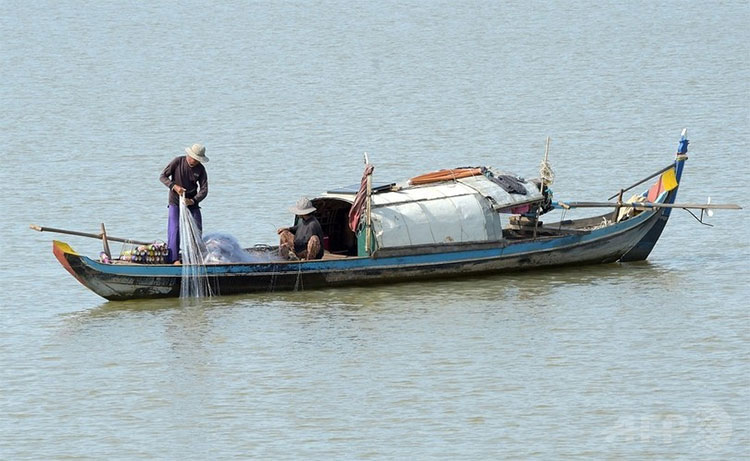New discovery of the process of forming the Mekong River
The Mekong, the 12th longest river in the world and the 7th in Asia, was formed about 17 million years ago.
It is the latest study conducted by the Department of Natural Resources and Environment at Lanzhou University, Gansu Province, China and published in the recent issue of Natural Geoscience.

Fishermen catch fish on the Mekong River flowing through Kandal Province, Cambodia.(Photo: AFP / VNA).
Professor She Junsheng of Lanzhou University, who led the study, said the river's slope is the main factor determining the formation of rivers , so determining the age of the Mekong valleys may be a clue to the clarification of when this river was formed.
Professor She Junsheng and members of the research team used methods to measure the temperature changes of the collected rock samples in the valley and study their heat generation to determine the age of the Mekong valleys. Since then, scientists have concluded that the slope in the upper, middle and lower reaches of the Mekong valley was formed about 17 million years ago, thus creating the river.
The study also shows that rainfall is increasing and erratic weather caused by the stronger rainy season in East Asia has made the banks of the Mekong River become steeper, a sign that also leads to conception river.
Originating from the Tibetan plateau in Qinghai Province, western China, flows through Laos, Myanmar, Thailand, Cambodia and Vietnam. This river is an important commercial waterway between Western China and Southeast Asian countries.
- Small dams threaten fish species on the Mekong River
- Reduce the environmental impact of the Mekong River
- Thailand studies a flow of a tributary of the Mekong
- More than 87.3 million USD to overcome the disaster of Mekong River
- 'Should postpone dam construction on the Mekong for 10 years'
- It is proposed to postpone the construction of a dam on the Mekong River
- Smashing the Mekong River
- Emergency news on the Mekong River
- No decision has been made on Lao hydroelectric dam
- Lessons from Thailand for dams on the Mekong River
- The US supported the postponement of the construction of the Lao hydroelectric dam
- Experts call on Laos to abandon the hydroelectric dam
 'Fine laughs' - Scary and painful torture in ancient times
'Fine laughs' - Scary and painful torture in ancient times The sequence of numbers 142857 of the Egyptian pyramids is known as the strangest number in the world - Why?
The sequence of numbers 142857 of the Egyptian pyramids is known as the strangest number in the world - Why? History of the iron
History of the iron What is alum?
What is alum? There is a strange river in Russia, no water but still hear the sound of babbling all year round
There is a strange river in Russia, no water but still hear the sound of babbling all year round  Top 8 longest rivers in Vietnam
Top 8 longest rivers in Vietnam  Why are there so many giant fish flooding the Three Gorges Dam but no one dares to catch them?
Why are there so many giant fish flooding the Three Gorges Dam but no one dares to catch them?  Tigris River: The Origin of Human Civilization
Tigris River: The Origin of Human Civilization  Antarctica's longest river flows back out of the sea
Antarctica's longest river flows back out of the sea  The only lake that flows into both the Atlantic and Pacific Oceans
The only lake that flows into both the Atlantic and Pacific Oceans 